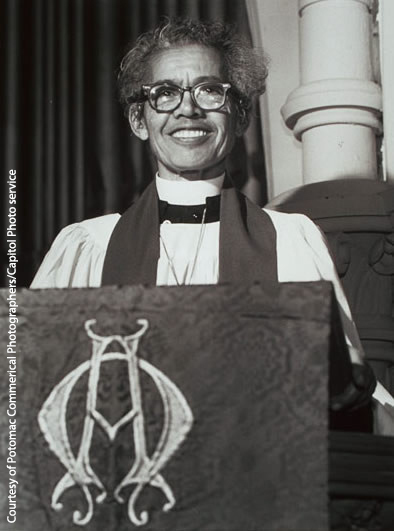Pauli Murray
Pauli Murray, a descendant of a North Carolina enslaved individual and slave owner, was an early and committed civil rights activist and the first African American female priest ordained in The Episcopal Church. She was baptized Anna Pauline Murray by the Reverend George F. Bragg in 1911. After her parents’ death, Pauli moved from Baltimore to North Carolina at the age of three to live with her grandparents and aunt after whom she was named.
Murray graduated from Hunter College in 1933. After a campaign to gain admission into the all-white University of North Carolina law school in 1938, she was denied entry due to her race. The next year she took a job with the Workers’ Defense League and went on to graduate from Howard University Law School in 1944. She was then denied admission to Harvard University for an advanced law degree because of her gender. In 1945 Murray successfully completed her Masters of Law degree at the University of California, Berkeley. Her master's thesis was “The Right to Equal Opportunity in Employment,” which Thurgood Marshal labeled the “bible” for civil rights lawyers. Twenty years later, she became the first African American to be awarded a Doctor of Juridical Science degree from Yale University Law School.
Committed to dismantling barriers of race, Murray was also dedicated to the feminist cause. She was appointed to serve on the Civil and Political Rights Committee of the President's Commission on the Status of Women (PCSW) in 1961. In the mid-1960s, Murray began serving as a member of the Equality Committee of the American Civil Liberties Union (ACLU) working to revise the ACLU policy on sex discrimination. She was also a founding member of the civil rights group of the National Organization for Women (NOW) in 1966. Murray saw the civil rights and women’s movements as intertwined and believed that black women had a vested interest in the women’s movement. Keenly aware of racial discrimination, Murray was unaware of sex discrimination until she attended Howard, a predominantly black university. According to Murray, there wasn’t any racial discrimination at Howard, “so the sex discrimination stood out in bold relief.”
Murray taught at Benedict College in South Carolina, in Ghana, and at Brandeis University until the death of her close friend Renee Barlow in 1973. The experience of ministering to Barlow on her deathbed "in ways [she had] associated only with the ordained clergy" forced Murray to recognize a call to the priesthood, which she had felt before but tried to ignore, feeling herself unworthy. After Barlow's death, she began her studies at General Theological Seminary in 1976 and was ordained at the National Cathedral the following year. She served at Church of the Atonement in Washington D.C. from 1979 to 1981 and at Holy Nativity Church in Baltimore until her death in 1985.
Her books include States' Laws on Race and Color (1951), the family memoir Proud Shoes: Story of an American Family (1956), The Constitution and Government of Ghana (1961), Dark Testament and Other Poems (1970), and the personal memoir Song in a Weary Throat: An American Pilgrimage (1987).
Pauli Murray died on July 1, 1985 at the age of 74. Her personal papers are located at the Schlesinger Library.

